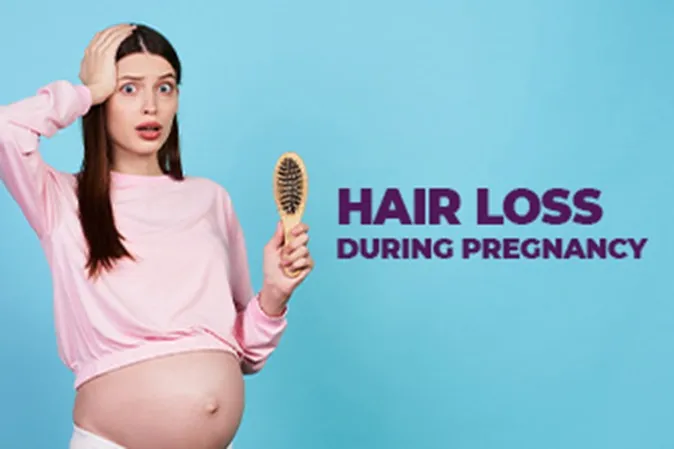Pregnancy is a transformative journey marked by numerous physical and emotional changes. While some of these changes are anticipated, others may come as a surprise. One such unexpected change that some women experience during pregnancy is hair loss. Although it can be distressing, it’s important to understand that hair loss during pregnancy is not uncommon, and in many cases, it is temporary and manageable. In this article, we will explore the causes of hair loss during pregnancy, how to manage it, and offer some helpful tips for women going through this experience.
The Causes of Hair Loss During Pregnancy
Hormonal Changes: Pregnancy brings about significant hormonal fluctuations, particularly an increase in estrogen levels. While estrogen usually promotes hair growth, the sudden rise in hormone levels during pregnancy can sometimes lead to hair shedding, as hair growth cycles are affected.
Telogen Effluvium: A common cause of hair loss during pregnancy is a condition called telogen effluvium. This occurs when a larger than-usual percentage of hair follicles enter the resting phase (telogen) and then shed. It often occurs a few months after a triggering event, such as childbirth, and can result in noticeable hair loss.
Nutrient Deficiencies: The demands of pregnancy can deplete essential nutrients like iron, zinc, and biotin, which are crucial for healthy hair growth. Deficiencies in these nutrients can contribute to hair loss.
Stress and Emotional Factors: The emotional and physical stress associated with pregnancy can also play a role in hair loss. Chronic stress may disrupt the hair growth cycle and lead to shedding.
READ: Polycystic Ovary Syndrome (PCOS)
Managing Hair Loss During Pregnancy
Consult your doctor: If you are experiencing significant hair loss during pregnancy, it is advisable to consult with your doctor or a dermatologist. They can assess your condition, rule out any underlying medical issues, and provide guidance on appropriate treatments.
Prenatal Vitamins: To ensure you’re getting the necessary nutrients for both your baby’s development and your hair health, consider taking prenatal vitamins. These supplements often contain key vitamins and minerals that support hair growth.
Maintain a Healthy Diet: Eating a balanced diet rich in fruits, vegetables, lean proteins, and whole grains can help combat nutrient deficiencies and promote healthy hair growth.
Manage Stress: Engage in relaxation techniques such as yoga, meditation, or deep breathing exercises to help manage stress levels. Reducing stress can have a positive impact on your overall health, including your hair.
Gentle Hair Care: Be gentle with your hair. Avoid excessive brushing or styling that could cause additional damage. Use mild shampoos and conditioners, and avoid excessive heat from hair dryers and styling tools.
Consider Hairstyling: Opt for hairstyles that do not put too much tension on your hair, like loose braids or ponytails. Avoid tight hairstyles that can cause hair breakage.
Be Patient: Remember that hair loss during pregnancy is often temporary. Many women find that their hair begins to return to its normal thickness and growth pattern in the months following childbirth.
READ: Hormonal Imbalance
Conclusion
Experiencing hair loss during pregnancy can be concerning, but it’s essential to recognize that it is a common and often temporary occurrence. Hormonal changes, nutrient deficiencies, and stress can all contribute to this phenomenon. By consulting with your doctor, maintaining a healthy lifestyle, and practising gentle hair care, you can manage hair loss during pregnancy and look forward to healthier, thicker hair in the postpartum period. Remember that your body is undergoing tremendous changes to nurture and support your growing baby, and taking care of your hair is just one aspect of your overall well-being during this special time in your life.
FAQS:
Should I dye my hair during pregnancy?
Using hair colour, or ‘dye’, is not thought to cause harm to your developing baby because your hair doesn’t absorb enough harmful chemicals to affect you or your baby. The amount of toxic chemicals in hair dye is not high. However, as there is not a lot of research into the use of hair dye and pregnancy, you may prefer to delay colouring your hair until after the first trimester (first 12 weeks of pregnancy) is complete.
What hair products should I avoid while pregnant?
Skip keratin hair-straightening treatments during pregnancy. They contain harmful formaldehyde.
Is it safe to use henna while pregnant?
Natural henna, from the henna plant, with no added chemicals, is safe to use as a hair dye or on your skin. This type of henna is brown, and it’s often suggested as an alternative to chemical hair dyes while you’re pregnant.
Is it safe to use hair oil while pregnant?
For effective hair care during pregnancy, you should massage your hair with oil at least twice or thrice a week or before each shampoo. You can use natural hair oils like coconut, olive, jojoba, sesame, or almond.



